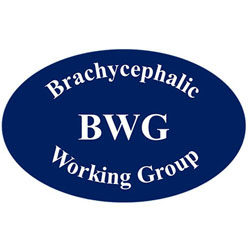10th July, 2020: BWG feature in Vet Record article “Puppy prices soar in Covid-19 lockdown”
26th Feb, 2019: BWG release a statement following Channel 5’s Jeremy Vine televised discussion: “Should people be buying brachycephalic dogs”?
7th Feb, 2019: BWG influence the evidence base on opinion in the US about brachycephalic dogs
2nd Feb, 2019: THE KENNEL CLUB AND UNIVERSITY OF CAMBRIDGE LAUNCH VITAL SCHEME TO IMPROVE HEALTH OF PUGS, FRENCH BULLDOGS AND BULLDOGS
The future health of French Bulldogs, Pugs and Bulldogs has taken a huge step forward today with the launch of a new health screening scheme.
Developed by the University of Cambridge and funded by the Kennel Club Charitable Trust, the new Respiratory Function Grading Scheme assesses dogs for the presence and severity of a breathing problem known as BOAS (Brachycephalic Obstructive Airway Syndrome). The scheme is currently available for any Pug, French Bulldog and Bulldog, and has the potential to improve the health and welfare of these breeds for generations to come. The scheme provides breeders with a means to know more about the health of their dogs, giving them the information they need to reduce the risk of breeding puppies with BOAS.
Dogs with a flat, wide-shaped head are said to be brachycephalic (‘brachy’ meaning short, and ‘cephalic’, meaning head). The soft tissue in the nose and throat of some brachycephalic dogs may be excessive for the airways, partially obstructing the airway and making it difficult for them to breathe normally (causing heavy panting or noisy breathing). This condition is known as BOAS and is a progressive disorder that can impair a dog’s ability to exercise, play, eat and sleep.
The scheme’s launch, which took place at the University of Cambridge, saw presentations from the leading BOAS researchers and vets, and Kennel Club breed and genetics experts, to guests from across the canine health and welfare spectrum. It provided the opportunity to develop a better understanding of the process behind the scheme, including a demonstration carried out by Chief Assessor Dr Jane Ladlow, who has been leading the BOAS research and development of the scheme at the University of Cambridge.
The assessment, which can now be carried out by a number of specially-trained assessors located across the UK, involves listening to the dog’s airway both before and after an exercise tolerance test. Assessors, who are all specially-trained BOAS vets, then use a pre-defined protocol to grade the dog from zero to three. Dogs graded as zero will be free of respiratory signs of BOAS, while dogs graded as three will show severe respiratory signs of BOAS, indicating that further veterinary examination is advised. The scheme issues guidance that dogs graded three should not be bred from.
For Kennel Club registered dogs, these grades will be recorded on the Kennel Club’s database and published in the Breed Records Supplement, on the dog’s registration certificate, and on the Kennel Club Health Test Results Finder and Health webpages. The BOAS scheme will be supported by guidelines for breeders, which enable them to understand the grade for their dogs in terms of risk when considering potential matings.
Speaking at the inaugural launch event, Bill Lambert, Senior Health and Welfare Manager at the Kennel Club said: “The high demand for these breeds, combined with the already recognised health problems has made brachycephalic health and welfare one of the most pressing canine issues in the UK, and one of the Kennel Club’s top priorities. We’re proud to have been able to fund and develop this important scheme with the University of Cambridge and continue to support further research into BOAS, together with the other steps we are taking to improve the health of future generations of these breeds.
“Launching the BOAS scheme is a huge step in the right direction to improve the health of these brachycephalic dogs and protect the future of these much-loved breeds. It will enable vets to identify dogs at risk of BOAS, provide breeders and owners with the best available information and advice to make informed decisions and inform ongoing research into the condition.”
Dr Jane Ladlow, MA VetMB CertVR CertSAS DipECVS MRCVS, Royal College and European Specialist in Small Animal Surgery at the University of Cambridge, said: “The way that BOAS is inherited is very complex and so not always entirely predictable. We are researching the genetics of this condition but it is likely to take a few years before we have a viable genetics test. We have realised over the last few years how useful the functional grading scheme is in determining disease severity and it reflects the initial genetic data we have. The scheme is a vital tool to help advise all owners if their dog is affected by BOAS and gives guidance to breeders to lower the risk of producing affected puppies. It also, crucially, facilitates important data collection and enables researchers to monitor the frequency of the condition and progress in the breed affected, which will inform ongoing research, for the overall improvement of relevant breeds.
“We look forward to working with the Kennel Club and other collaborative parties dedicated to improving brachycephalic dog health across the board through promoting the scheme and engaging vets, breeders and puppy-buyers to raise awareness and understanding of this complex Syndrome.”
Brachycephalic Working Group Chairman, Dan O’Neill, said:
“The Brachycephalic Working Group (BWG) welcomes and supports this new scheme as a positive step towards improving the diagnosis, treatment and care of affected brachycephalic dogs and the health of future generations.
“The scheme is a practical, accessible and evidence-based tool that we would urge anyone who breeds Pugs, Bulldogs or French Bulldogs to use to help to reduce the breathing problems these breeds can face, which is a shared goal of everyone who cares about dogs and their health and welfare.
“This collaborative approach, which also generates further evidence, will accelerate the continued development of practical tools and sensible resources to help improve the health of these dogs.
“We also encourage owners of Pugs, Bulldogs or French Bulldogs , who have concerns that their dog could potentially be affected by breathing problems, to consider requesting this assessment and speaking to their veterinary surgeon, so that their dog gets the best possible diagnosis and care.”
For more details on the scheme please see the Kennel Club website and the BOAS research group website at: www.vet.cam.ac.uk/boas
Follow us on Twitter and Instagram
www.twitter.com/TheKennelClubUK
www.instagram.com/thekennelclubuk
Like our Facebook page
www.facebook.com/thekennelclubuk

Pictured above: The University of Cambridge BOAS research team at the launch event. From left, Jane Ladlow, Dr David Sargan and Nai-Chieh Liu. Credit: The Kennel Club and Heidi Hudson
